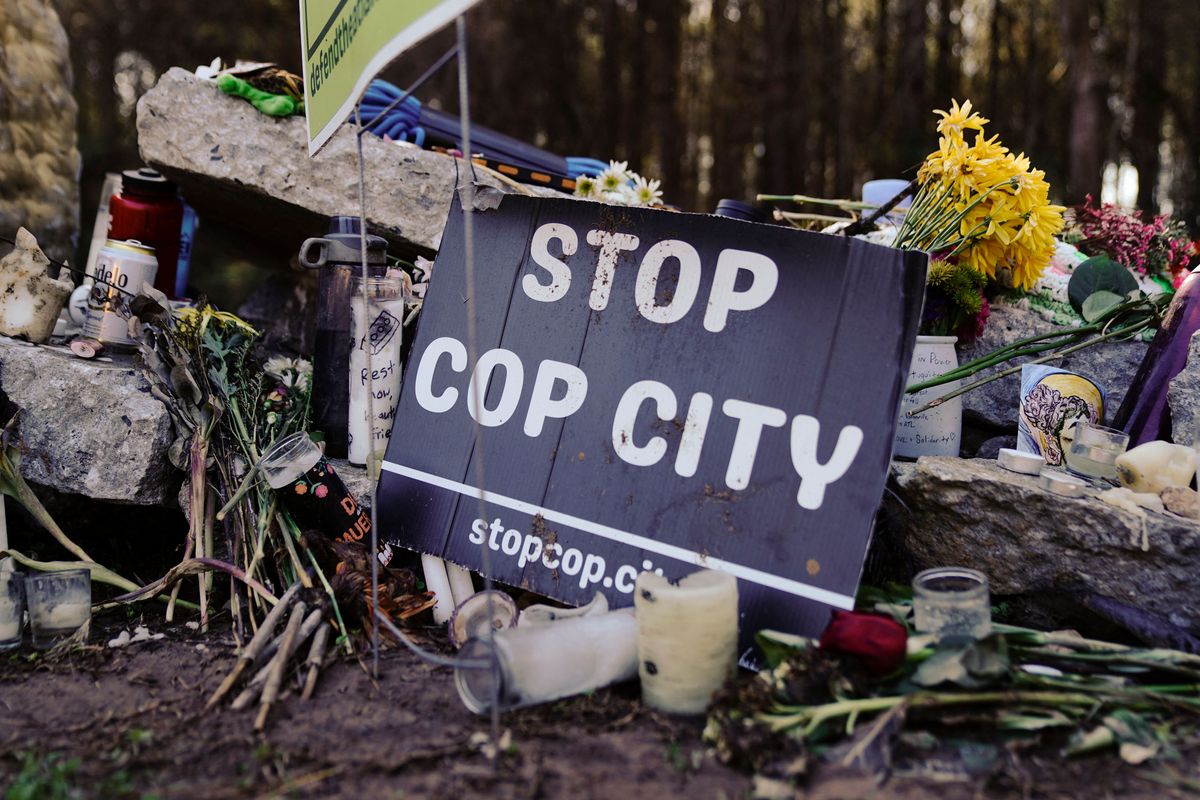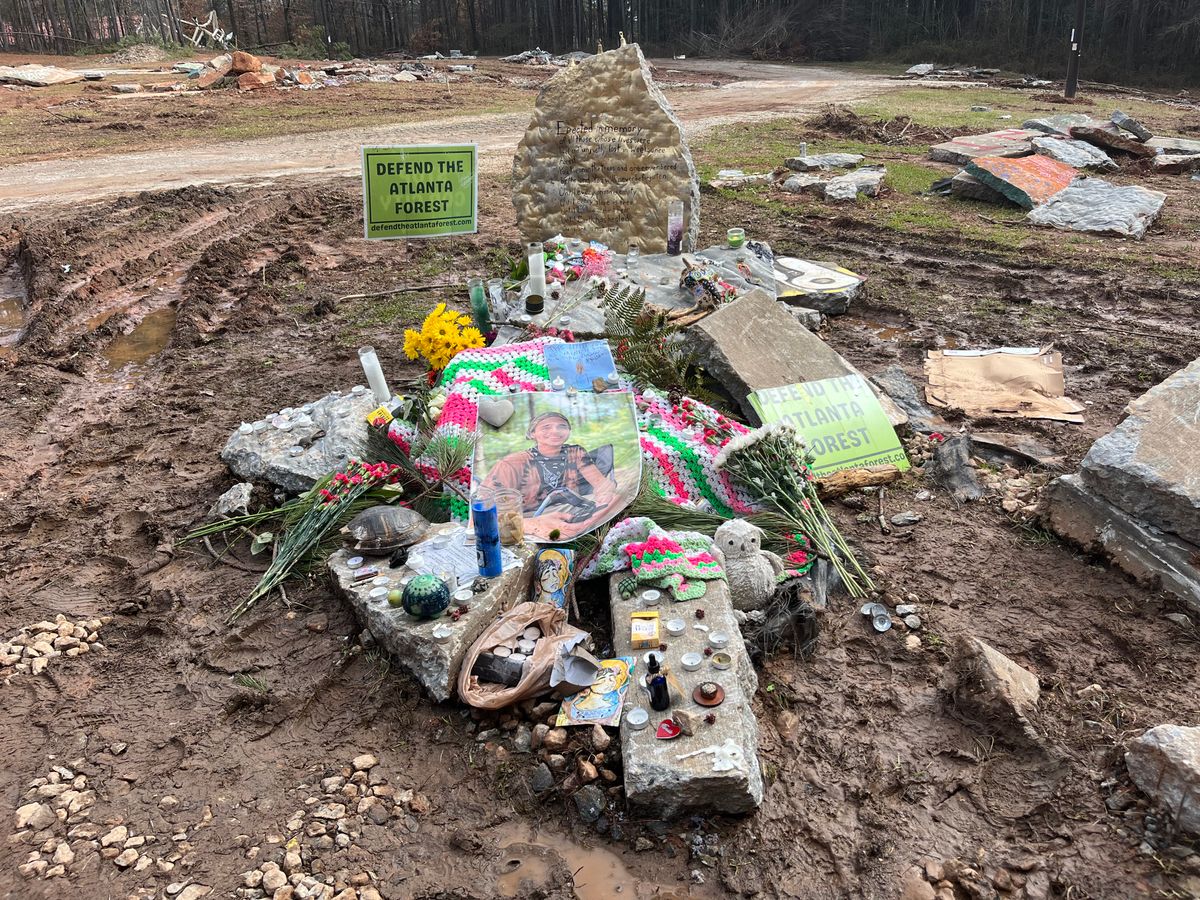Stop Cop City Dallas
It's going to be a long fight

by Tynan Stewart
Read more Hell World coverage of the Stop Cop City Atlanta movement here:


At first, Jessica Ramírez wasn’t even sure it should be called “Cop City.”
The new police training academy, which would occupy five acres of the University of North Texas at Dallas campus where Ramírez is a student, seems small compared to the 85-acre compound currently under construction in the Atlanta forest. There’s also the fact that initial designs for the Dallas facility don’t include an entire faux cityscape where cops can be trained in the tactics of urban warfare, at least not yet.
But its opponents have gone with the name anyway: It’s Cop City Dallas.
“I didn’t want to call it that, but there’s no other thing to call it,” said Ramírez, who volunteered to distribute flyers on her campus. “Because it is what it is.”
While the facility has been in the works since at least 2020, opposition has ramped up in recent weeks. Organizers with Stop Cop City Dallas, a coalition of local left-wing groups, have been knocking doors and handing out flyers at polling places, asking voters to reject an upcoming bond project that would funnel $50 million in public funds to the police academy. The election is May 4 but early voting is underway.
The Dallas Police Department already has a training facility, but arguments for why they need a new one closely echo those made by Atlanta cops: Dallas’s current facility is old. A replacement would, in the words of Dallas police Chief Eddie Garcia, “boost recruiting, retention and morale.” City officials also hope the new academy will provide "revenue generating opportunities.”
Translation: They want it to serve as a training camp for police departments across North Texas.
“They are not branding it in any way, shape or form as a Dallas police force thing,” said Baiyinah Abdullah, an organizer with Stop Cop City Dallas, at a recent community town hall. “It’s a regional training facility. So there’s going to be cops from all over.”
And this is perhaps the best argument for labeling the project a new Cop City. The training facility may be housed in Dallas, but like the vast complex growing in the Atlanta forest, its effects will be felt far beyond the City of Hate.
On a recent Sunday afternoon, a few dozen organizers and local residents gathered in Pan-African Connection, a book store, art gallery and resource center just a few miles north of UNT Dallas, for the town hall convened by opponents of Cop City Dallas.
“You might not want a new cop facility for a totally different reason than I don’t want one,” said Jasmine Butler, a coalition organizer who helped facilitate the meeting. “But we will disagree in a way that’s civil and in a way that we still respect each other.”
“Unless you’re a cop, sorry, f-you” they quipped.
Butler and other organizers emphasized similarities between the Dallas and Atlanta projects, including the fact that Dallas’s new academy would require the destruction of green space on UNT Dallas’s campus. They screened a glossy commercial for the project that included an overhead shot of what the building might look like. Audible groans swept the room as trees melted away and were replaced by a few boxy structures and a parking lot.
The video, produced by Allyn Media, a Dallas-based public relations firm, is also an interesting window into how police are thinking about the new training facility, one that gets beyond standard lines about boosting morale and recruitment. Allyn Media previously helped coordinate a memorial ceremony for Dallas police in the aftermath of the 2016 killing of five officers in downtown Dallas, and that incident features heavily in the commercial, which includes TV news clips of cops flooding the streets of Dallas, weapons drawn, and still images of uniformed officers looking exhausted or anguished.
The implied message is clear: Nearly eight years on, Dallas police still see themselves as embattled and in danger. More training at this new academy will allegedly make them safer. But what about the communities they are supposed to protect and serve?
“Increasing police budgets to combat violence against the police is really just going to accelerate the issue,” said Katherine Bynum, a professor of history at Arizona State University whose work has documented Black and Brown freedom struggles in Dallas. “Communities of color are going to be policed with increasing severity as we’ve seen throughout the decades.”
What goes unmentioned in the promotional video is, of course, the long history of police brutality inflicted on these communities in Dallas: The murder of Santos Rodríguez, a Mexican-American boy who was shot in the head by a Dallas police officer in 1973. The death of Etta Collins, a Black Sunday school teacher who in 1986 called the cops about a burglary, only to be shot and killed by a responding officer. Not to mention the more recent violence inflicted on Black Lives Matter protesters in the summer of 2020.
“Really this idea that policing makes communities more safe is untrue and it’s unfounded,” Bynum said “It just exposes . . . both police and communities of color to more violence and danger.
This history is important context for the present campaign against Cop City Dallas. In the area of city where the new academy will be built, 51% of residents are Black and 45% are Hispanic or Latino, while UNT-Dallas itself is also extremely diverse.
Eli T., a Dallas resident who lives nearby and volunteered to canvas against the upcoming bond proposition, said she’d like to know how many Dallas cops actually live in the neighborhoods they police. Data from a few years ago suggests most don’t.
“My whole family is Hispanic. I was taught from age five, cops come to the door, you don't answer, you don't talk to them, so it was shocking for me to grow up and find out other people thought the cops were helpful,” Eli told me. “I've been in the car when my mom's been pulled over, and I see how they treat her as a woman of color and I wouldn't wish that on fucking anybody."
Some voters in the area would prefer the $50 million in bond funding be spent on other priorities. Tamera Hutcherson, a member of Stop Cop City Dallas who has spent time knocking doors for the coalition, said she talked to one resident who suggested a 24-hour youth center that might keep kids off the street and out of trouble.
“A lot of the voters we're reaching — specifically in District 8 where it is slated to be built — are older Black voters, and a lot of them are unaware,” Hutcherson said.
This lack of awareness isn’t surprising: Turnout in the city’s municipal elections is usually low. Only 8.8% of eligible voters cast ballots in last year’s city council elections. While Stop Cop City Dallas is doing its best to draw attention to the bond issue, its members know halting the facility’s construction is not just about rallying opposition at the ballot box.
For one thing, the project has already secured other sources of funding: $20 million from the Texas state government and $10 million from the Communities Foundation of Texas. While that’s well short of the $152 million total estimated cost, former City Councilwoman Jennifer Gates, who is helping the city fundraise from private sources, said at a public meeting in November that other foundations were waiting to see whether the city was “fully supportive” before publicly committing themselves.
“I'm not naive, I know that this doesn't end at the vote, even if it gets voted down,” said Nora Soto, an organizer who has followed the progress of the bond program since June. “They're still going to build it, they're just going to have to figure out somewhere else to get the money.”
"It's going to be a long fight."
Tynan Stewart is a writer and journalist based in Fort Worth, TX. He publishes Lost in Panther City, a newsletter about Fort Worth and North Texas. Follow him on Instagram for book reviews and pictures of his guinea pigs: @panthercitybooks.
